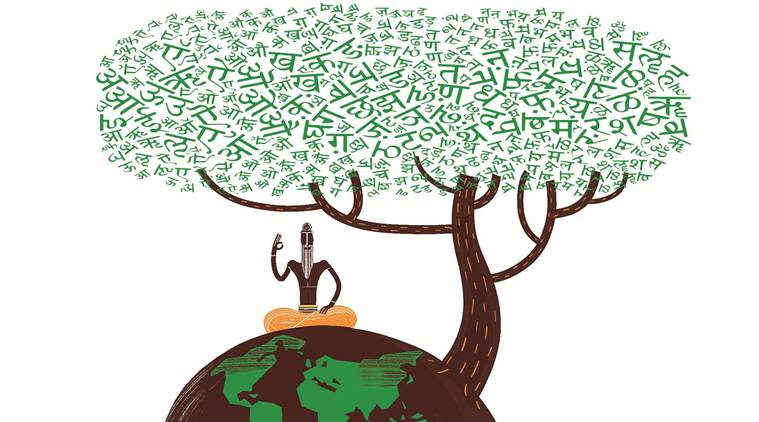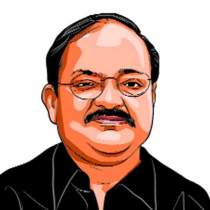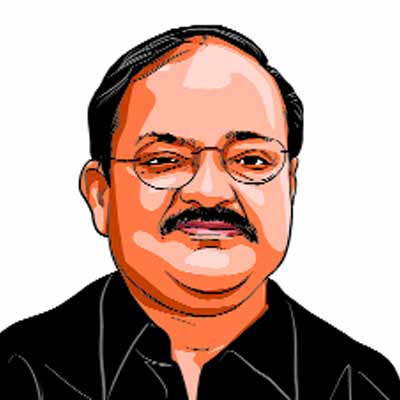Make India Vishwaguru again
To reclaim our place as the leader in the realm of education and ideas, we must stop blindly aping the West. We must deepen our understanding of our intellectual heritage.

Access to education has expanded but what we need to do is to transform our institutions into “learning” institutions that constantly reinvent themselves and position themselves to be the leaders in knowledge production and knowledge dissemination. (Illustration: CR Sasikumar)
Ever since I became the vice-president, I have been visiting various universities to attend their convocations. I keep reflecting on the glorious Indian heritage, the heights to which education had reached in the past and the ways in which we can re-infuse that spirit of excellence in our education system. We have a rich tradition of debate and dialogue in the pursuit of knowledge. The Upanishads are an eloquent testimony to the constant, constructive dialogue between the teacher and the taught. Thanks to innumerable thinkers, researchers and teachers who absorbed the best in the world and charted out a path on their own, India emerged as a global centre of learning and was described as “Vishwaguru”. The world looked up to India.
“We owe a lot to the Indians, who taught us how to count, without which no worthwhile scientific discovery could have been made,” said Albert Einstein. Mark Twain described India as “the cradle of human race, the birthplace of human speech, the mother of history, the grandmother of legend, and the great-grandmother of tradition. Our most valuable and most instructive materials in the history of man are treasured up in India only.”
Ancient India was home to some of the famous centres of learning like Takshashila, Nalanda and Pushpagiri, which attracted knowledge seekers and savants from across the country and the world. The Vedas and subjects such as agriculture, philosophy, mathematics, archery, military arts, surgery, medicine, astronomy, futurology, magic, commerce, agriculture, music and dance were taught at these centres of higher learning. In the 7th century AD, Xuanzang, a Chinese scholar, studied with many famous Buddhist masters at the famous university at Nalanda. When he returned, he carried with him some 657 Sanskrit texts. With the emperor’s support, he set up a large translation bureau in Xi’an with collaborators from all over East Asia. Chanakya, the author of Arthashastra and Charaka, famous Ayurvedic physician, were products of Takshashila.
The excavations of urban settlements and buildings at Harappa and Mohenjodaro have proved that India was ahead of others in the world at that time. India’s priceless contribution of the zero and decimal system and its advancements in the fields of metallurgy speak of its greatness as an early world civilisation. Kanad spoke of “anu” and its indestructible nature long before John Dalton propounded the atomic theory. Sushrutha is known as the father of plastic surgery.
India could achieve this excellence because it valued learning. It is also a country that welcomed good ideas from everywhere and said in the Rig Veda: Aano bhadraah krathavo yantu vishwathaha (Let noble thoughts come to us from all sides). This assimilation, acceptance and adaptation, leading to ideation, lay at the heart of India’s progress in the realm of ideas.
We need to foster a new mindset — not the blind acceptance of any concept wherever it has emanated from but adopt an analytical stance. Some would describe this as moving away from the colonial mindset in which we unquestioningly adopt and borrow from others. Many like Koneru Ramakrishna Rao feel that the westernisation of India’s education system has robbed Indians of original thinking and made them develop a mindset of looking with awe at anything Western, while undervaluing one’s own culture and native ethos. The way to overcome this syndrome is to deepen our understanding of our intellectual lineage and draw lessons for the revitalisation of the education system.
Education is a life-long process. However, it is important to ensure that children are taught in their mother tongue for better learning outcomes. Imparting value-based education rooted in our socio-cultural milieu is the need of the hour. What we need today is a critical mass of people who are imbued with this spirit of inquiry, a mindset that doesn’t rely on blind belief but searches for answers and evidence through relentless research as well has an openness to new ideas.
Our ancient thinkers saw the acquisition of knowledge as a liberating experience. It liberates us from ignorance, superstition, irrational prejudices and unfounded fears. “Saa vidyaa yaa vimuchyathe,” they said. Rabindranath Tagore had called for a renaissance where the “mind is without fear and the head is held high”. That’s the heaven of freedom we all should aspire for. The colonial shackles must be broken. As Kalidasa, the great Sanskrit poet says, “All that is ancient is not necessarily good. Nor should you think that whatever is modern is bad. Wise persons carefully analyse and come to a conclusion whereas the foolish persons are blindly led by other’s views.”
There are numerous statements in our ancient texts that can inspire all of us to rise to greater heights. We need to study these texts and internalise their key messages. For instance, at the end of the course of study, the teacher gives the following message to the students. This message taken from Taittariya Upanishad reads like a convocation address that is more relevant today than ever before: “Be truthful. Do your duties. Continue to study and learn. Do not swerve from the path of Truth and Dharma, and contribute something useful to the society. Aim for excellence. Keep improving your knowledge. Use whatever you have learnt and share your knowledge with others. Respect the gods and your ancestors. Look upon your parents, teachers and guests as gods. Always analyse and distinguish the good from the bad. Avoid the latter and always do what is good. Follow all that was good in your teacher’s life, not any other. You will meet with better men than even the teachers with whom you have lived. Show them due respect. ”
This advice has many important elements that are critical for making the big leap we wish to make towards new high watermarks in educational leadership. The themes of lifelong learning, quality consciousness, social relevance of knowledge, ethics, empathy, reverence, humility and commitment find a sharp, succinct expression.
The post-Independence Indian education system has produced outstanding scholars, scientists and achievers in different fields with institutions like Indian Institute of Science, IITs and IIMs emerging as centres of excellence. Access to education has expanded but what we need to do is to transform our institutions into “learning” institutions that constantly reinvent themselves and position themselves to be the leaders in knowledge production and knowledge dissemination.
While absorbing the best educational practices and concepts from around the globe, we need to have an educational system that is best rooted in our culture, traditions and heritage. Swami Vivekananda had said, “Learn everything that is good from others, but bring it in, and in your own way absorb it; do not become others”.
We can be Vishwaguru once again only if we can make the quest for excellence the norm. We can elevate our institutions of learning into world-class institutions if we foster a culture of research and innovation, of instructional leadership and ethical behaviour. I do hope on this Teachers’ Day, commemorating the birth anniversary of Sarvepalli Radhakrishnan, the first Vice President of India, we shall accord the respect due to our indefatigable teachers and facilitate their endeavour to transform the classrooms in which our country’s future is being shaped.
The writer is Vice-President of India
For all the latest Opinion News, download Indian Express App
More From M Venkaiah Naidu
- Atal Bihari Vajpayee only made friends, no enemiesAtal Bihari Vajpayee was both tender and tough. It was his ability to stay true to his values and also speak to all sections of…
- Swarajya to SurajyaTo build New India, today’s youth must look back at Bal Gangadhar Tilak and Chandra Shekhar Azad for inspiration...
- Lessons from dark timesRemembering Emergency: The people must stay at the forefront of protecting democracy...












.png)



























No hay comentarios:
Publicar un comentario